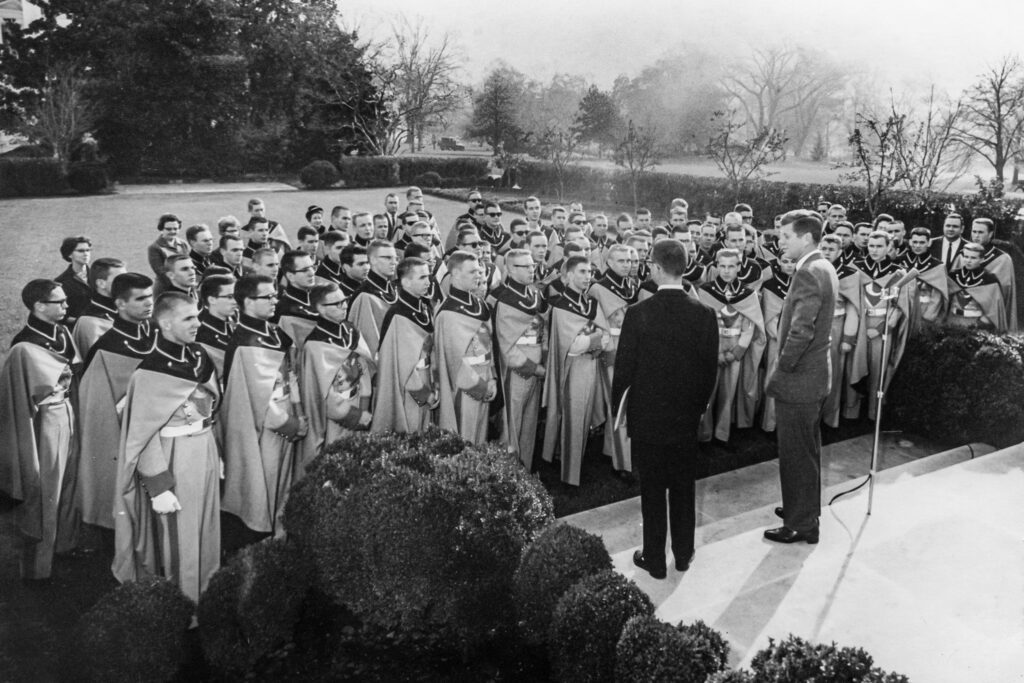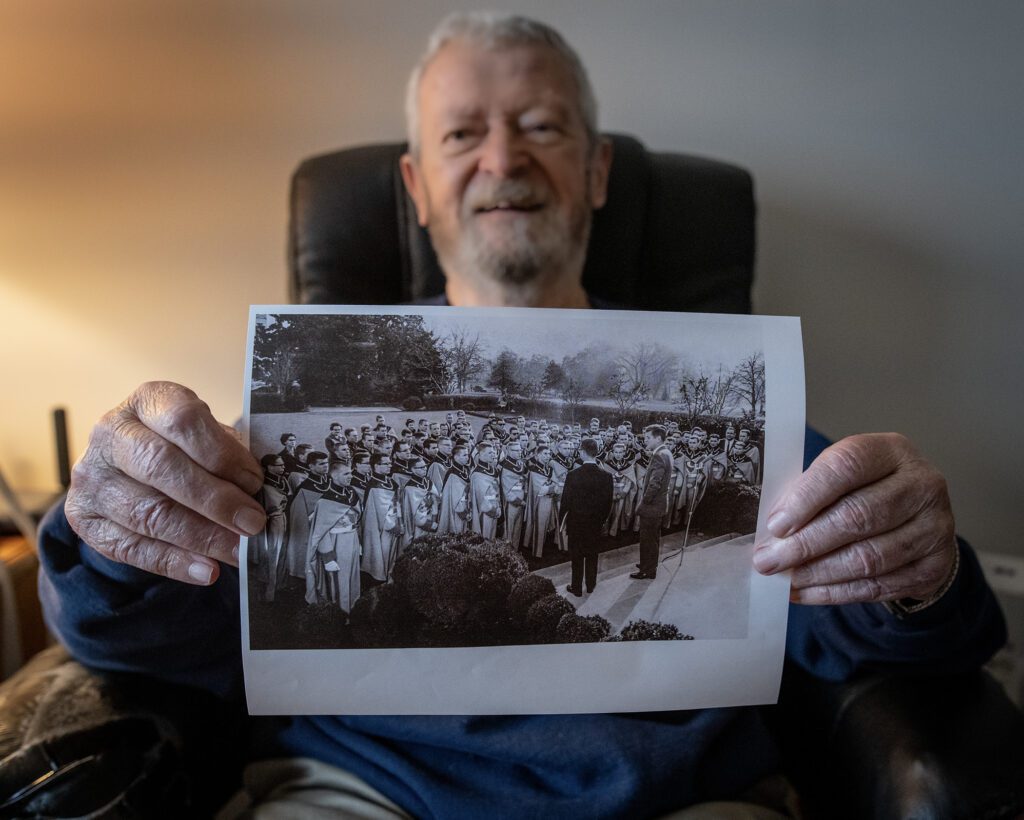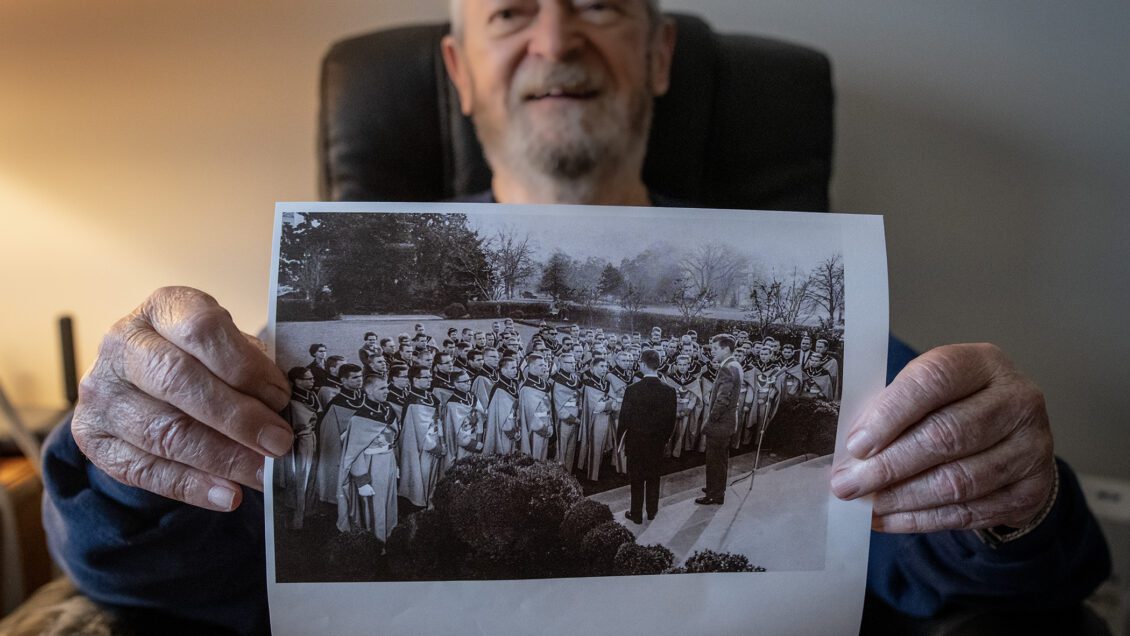Former Clemson University director of bands John Butler, 91, still remembers November 18, 1962, like it was yesterday. Meeting a president of the United States would be memorable for anyone, but meeting one of the most recognizable people in American history, President John F. Kennedy, at the White House alongside the members of Tiger Band would be impossible to forget.
“It was one of the most memorable days of my life, and I’m sure it was for everyone else there too,” says Butler during an interview in his apartment in Patrick Square, just a few miles from Clemson’s main campus. “I’m surprised more people don’t know about that story because it was reprinted dozens of times over the years, but young people today might not even know who Kennedy is!”
The band was in the area for the then-Clemson College Tigers game against the University of Maryland Terrapins, and Butler decided to take them sightseeing in Washington, D.C. for a day. With the help of Rep. William Jennings Bryan Dorn and Sen. Strom Thurmond, he was able to arrange a tour of the White House for the band. Thurmond put in a request for the president to meet with the band, but it was made clear the chances of that meeting taking place were remote.
“Thurmond was a good representative,” says Butler. “If anybody had a request, he saw to it dutifully. This one was no exception.”
When the band arrived at the White House, Butler was told they could not take their instruments in for security reasons, so they left them on the bus. A few minutes later, he was pulled aside and told that President Kennedy would, in fact, meet privately with the group in the Rose Garden.
A short time after the band filed onto the lawn, the doors to the porch opened, and President Kennedy stepped out and greeted Butler by his first name as he shook his hand.

Butler recalled the moment in an article he wrote for Clemson World in 2018: “He was every inch the same handsome, charismatic man the entire world knew. He welcomed us to the White House, and as we visited, he was completely charming, putting everyone at ease. He mentioned that he had seen Clemson play in the Orange Bowl. He pointed out a tree in the garden, and said Andrew Jackson had once remarked he was sorry he hadn’t hanged John C. Calhoun from it.” (Calhoun, whose Fort Hill plantation would eventually become Clemson’s campus, was also Jackson’s vice president from 1828 until 1832, when he resigned over differences in the policy of nullification.)
As the band gathered around the stage in their uniforms, Kennedy noticed something.
“You didn’t bring your instruments?” asked the president.
“No, sir, we were told not to,” Butler replied.
“Oh, well … they can sing, can’t they?” said Kennedy.
Butler chuckles when he recalls the moment, “Sure they could, but I was afraid they’d start singing the songs we’d sing on the bus together, which were not appropriate by any means! So, I started in with the alma mater, and they all joined in.”
As the band sang the Clemson alma mater to the president, Butler noticed several of the workers around the grounds acting strangely.

“You can see in the picture the band members were all wearing their cloaks, and when they got to the part where you raise your hand during ‘O’er the mountain height,’ all these gardeners that were around jumped to their feet and reached to their waists. They were Secret Service agents in disguise!”
When they were finished, President Kennedy leaned into Butler and said, “I hope they play better than they sing.”
“I said, ‘They better!’” laughs Butler.
Almost exactly a year later, Kennedy was assassinated in Dallas on November 22, 1963, a defining event in American history that struck a particularly deep chord with Butler and the members of Tiger Band.
“It seemed that most members of Tiger Band, as well as myself, felt a special sense of loss that afternoon, because of our shared experience with Mr. Kennedy almost exactly a year earlier,” Butler says.
Butler still tears up when speaking about the first football game after the tragedy, a matchup with archrival South Carolina that was postponed and then played on Thanksgiving Day. Butler adjusted the halftime show to include a solemn arrangement of “The Navy Hymn,” a favorite of Kennedy’s, who was a decorated Navy WWII veteran, followed immediately by “America the Beautiful.”
“As I was conducting … from a ladder on the field, I seemed to feel profound grief and respect for our fallen leader from every one of the tens of thousands of spectators in the stadium,” Butler writes in his 2018 piece for Clemson World. “There was not a sound to be heard except for the somber strains of the hymn as it reached its quiet conclusion and final ‘amen.’
As I let the final note very gradually fade to nothingness, I could observe tears streaming down the faces of quite a few of those band members closest to me. Aside from a few flags gently flapping in the end zones, there was not a sound to be heard. Many people were standing as we left the field, and there was no applause or cheering to break the spell — only a reverent silence.”
Butler, still a beloved figure in the Clemson community, was director of Tiger Band for six years and director of bands for 20 years. In 1968, he became the first person to be awarded a doctorate in music from the University of Georgia. His 27-year tenure at Clemson spanned multiple roles, including head of the music department and interim Dean of the College of Liberal Arts. He retired in 1987.

